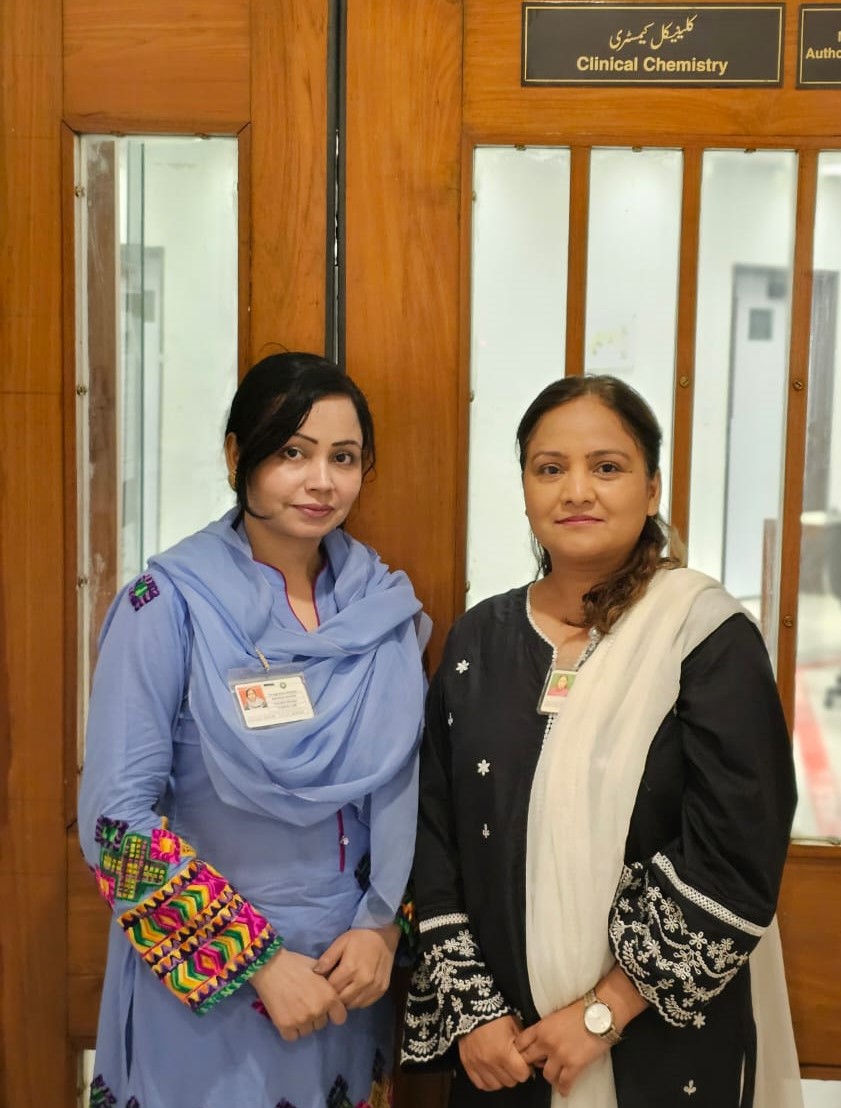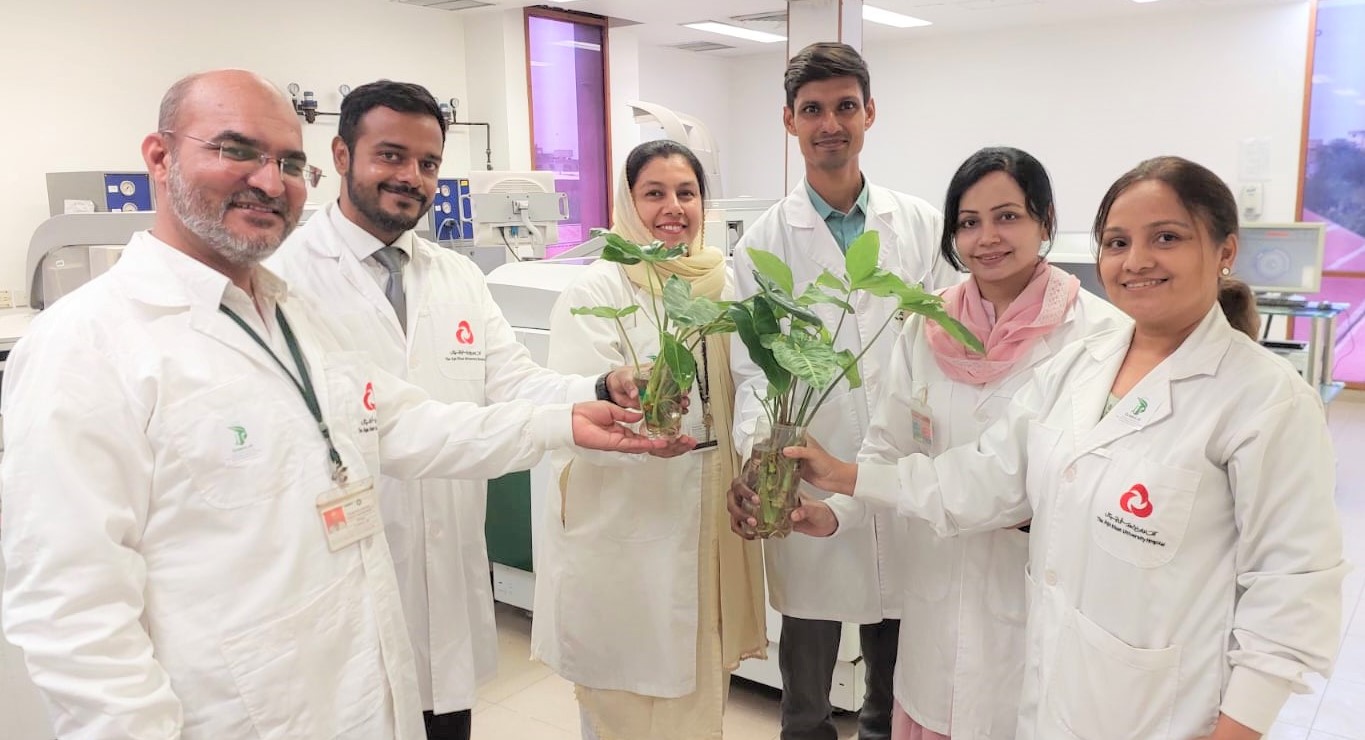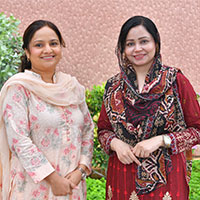Green Labs at AKU
 A Green Labs initiative at AKU has been initiated by Rizwana Kausar and Dr. Lena Jafri from the section of Clinical Chemistry in the Department of Pathology and Laboratory Medicine. ‘Green Labs’ refer to programs that promote sustainable practices in clinical laboratories. These include simple efforts to cut energy use, conserve resources, and limit waste creation.
A Green Labs initiative at AKU has been initiated by Rizwana Kausar and Dr. Lena Jafri from the section of Clinical Chemistry in the Department of Pathology and Laboratory Medicine. ‘Green Labs’ refer to programs that promote sustainable practices in clinical laboratories. These include simple efforts to cut energy use, conserve resources, and limit waste creation.
The Office of Environment and Sustainability interviewed them to understand their inspiration, process, and hopes relating to sustainability at AKU - read their story below.
What was the impetus for you to start implementing green labs?
In 2022, we both participated in the International Federation of Clinical Chemistry Conference in Seoul, South Korea. There, we were introduced to the concept of Green Laboratories. We learned that clinical labs are one of the major contributors to energy consumption and waste production in any healthcare setting. That was an eye opener.
Clinical labs have many energy-intensive equipments such as safety cabinets that are run 24/7. The use of water is also high to flush equipments and chemicals on a regular basis. Therefore, the environmental impact is huge.
At the conference, we were inspired to implement the Green Labs concept at AKU in Pakistan. We were further motivated by seeing the many environmental initiatives and communications shared by the AKU’s Office of Environment and Sustainability.
Upon our return, we started a Green Lab project, in which we are gradually implementing green practices such as reducing, reusing, and recycling waste and saving energy and water in our labs. Our aim is to decrease the environmental footprint of clinical labs at AKU Stadium Road, Karachi.
What green initiatives are you currently undertaking?
We have started tracking and reducing the consumption of paper in our daily lab operations. Our section recently shifted to electronic signing of specialized reports and certain lab tests and hence we have stopped printing them as per earlier practice.
Rizwana founded a "Green Team" in 2022 within the Section of Clinical Chemistry, comprising faculty members, technologists and managers. Together, they collaborate to advance sustainable practices and educate each other on resource conservation and waste reduction through quizzes and activities. The Green Team's objectives were officially established and approved by Lena as the section head of Clinical Chemistry. The team convenes on a monthly basis to review accomplishments, discuss progress, and engage in strategic planning for future green initiatives.
Our approach to sustainability within the team is collaborative and open. Rather than imposing measures, we encourage a culture where everyone is free to contribute their ideas. Technologists have been particularly proactive in coming up with innovative and sustainable solutions, driven by their genuine interest in the topic, even without any specific incentives from us.

What are some of the challenges you face to implement and scale this initiative?
There are no examples of Green Labs in Pakistan, so we have been researching and implementing different good practices. Another challenge is ensuring that our green practices are aligned with current regulatory requirements for CAP and JCI. Patient safety and wellbeing are our top priorities. Since Green Labs is a voluntary initiative, it can be challenging at times for us to find extra time to read up on different green practices. Furthermore, there is a lack of green infrastructure at AKU which means that procuring ecofriendly and energy efficient equipment is a challenge due to budget constraints.
What ideas and recommendations would you propose to overcome these challenges?
To start with, we would benefit from a green procurement policy which ensures only ecofriendly options are considered for all equipment and products. Moreover, there should be a forum where people across the University can share and discuss the green initiatives they are working on. We need role models and good ideas. You also need institutional leadership and the support of Departmental Chairs to scale this initiative to other labs in the University and Hospital. Not just moral support but also financial support is required.
What personally motivates you to work on sustainability?
Lena: I've been celebrating Earth Day since my school days and have been aware of the need to save water and energy to deal with pollution and global warming. I'm also trying to make my home greener by limiting wastage.
Rizwana: I am applying these practices at home too, such as switching off the lights and conserving water. These measures are also leading to financial savings, which is helpful in this time of inflation. Having access to information has motivated me to make my work and home more sustainable.
What makes you hopeful about your work and the future of sustainability at AKU?
We are happy to see the ongoing awareness and commitment to AKU’s environment and sustainability agenda. The available support and drive for environmental action within the institution makes us hopeful.
To scale the Green Labs initiative to other sections, we are working to develop a green task force for the Department of Pathology and Laboratory Medicine with our Chair. Plus, if we can apply for and earn a global certification for Green Labs, that would give us a lot of credibility and enable us to become the first hospital in the country with a certified green lab.

Dr. Lena Jafri &
Rizwana Kausar

